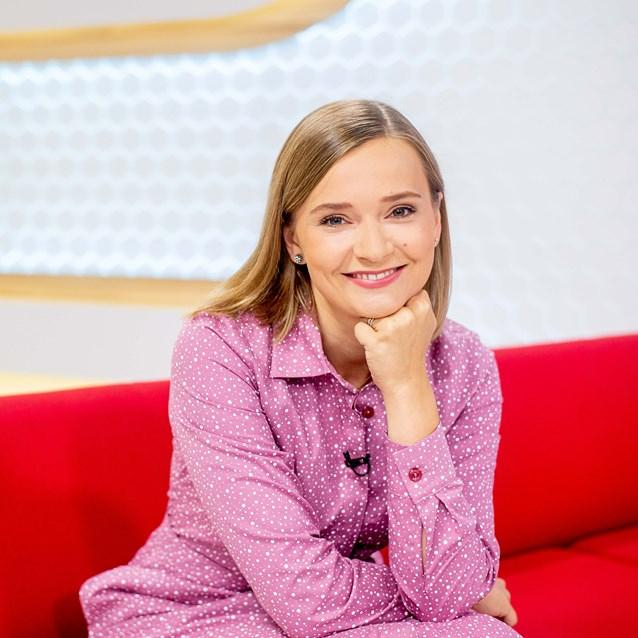Host of LRT information programmes / Journalism
Why did you decide to study at the Faculty of Communication?
I knew specifically that I wanted to study journalism and I thought it was best to do it at Vilnius University. When I was still in the 11th grade, I found a Sunday school for journalism, which was also organised by the Institute of Journalism at the VU Faculty of Communication. There I met some of the lecturers, heard first-hand about the subtleties of journalistic work, and also prepared for the entrance exam for journalism studies. After this school, it became even clearer to me that this was the course I wanted to choose. You could say that I had no alternative.
Do you have any memorable memories from your university days?
Probably the most memorable are the lecturers I met during my studies - D. Jastramskis, G. Deksnys, A. Katkevičius, and r.i.e.p. R. Sakadolskis. Once, during a lecture, Sakadolskis handed out our corrected essays, and I didn't get mine. After the lecture, the lecturer showed me my paper, which had a big coffee stain on it. He apologised for spilling the whole cup of coffee on my paper while correcting it, but said that he was more sorry for the delicious coffee than for the spillage - we both had a good laugh.
What was your first job in general and what was your first job after graduation?
My real first job was at LRT TV, where I still work. After two years of study, I did an internship in the News Service. But I came to the internship with a specific goal in mind - I really wanted to get an invitation to stay on and I did. It was not easy to combine work and studies, I had to rush from lectures to LRT, from LRT to lectures, coordinate interview times during breaks, or even manage to hang on to something. But once I got into the rhythm of it, I soon realised that I was enjoying it, not finding it exhausting.
Did the Faculty of Communication influence your personality? And did the knowledge and skills you acquired at university come in handy at work?
Of course yes. Undergraduate studies and the people you meet in an academic environment help to broaden your horizons and answer many questions that a young person is constantly asked. As journalism studies are characterised by a compulsory internship after each course, it is particularly helpful to find out if you are on the right track, and it also prepares you for your future job.
Tell us, what does your working day look like? Can you name the challenges you face most often at work these days?
Almost every day is different. One day I produce and present the morning news on "Labas rytas, Lietuva", the next day I present this programme, and the next day I produce and present the daytime and evening news. There is certainly no room for routine in my work. Working on the morning news, or hosting 'Labas rytas, Lietuva', the day starts at 3:50. I have to keep up with the flow of news from Lithuania and abroad, and I prepare and check the information myself. I spend most of my time searching for interviewees and preparing for interviews. The topics I have to talk about with the interviewees are very different, so preparation is essential. One of the biggest challenges in my job is that you never know what is going to happen at any given moment. On the other hand, it's one of the most fascinating things about being a journalist. It's particularly exciting when you're working live, because at any moment you might have to report on a disaster, a loss, or maybe the fact that someone has been born, or has won a prize, or whatever.
What is most important to you in your work?
For me, it's the team. You can't do anything on television alone. It's important to trust each other, to communicate constantly with producers, editors, journalists, directors. This is especially important during live broadcasts, there are situations when you don't know what's going to happen in a second, but all it takes is one word from a director or producer into an earpiece and everything continues to run smoothly.
Do you have specific goals in your work?
One of the most important goals in my work is to have a trusting audience, who first and foremost look to LRT for breaking news. As I work mainly in news, I aim to report the news in a clear, understandable way and, if possible, as quickly as possible. It is also important that the focus is not on me, but on the news I am reporting.
Based on your study experience, what advice would you give to current students of the Journalism degree programme or to students in general?
I would wish journalism students to be as courageous as possible. At the beginning of my studies, I was definitely much more modest, and I had a lot of different fears. But very quickly I realised that you have to be less hesitant, more interested, not afraid to ask questions, many times if necessary. A journalist has to be inquisitive, not tired of looking for answers. If there is no inner curiosity, no interest in what is happening not only in Lithuania, but also in the world, maybe this is not the right way.

